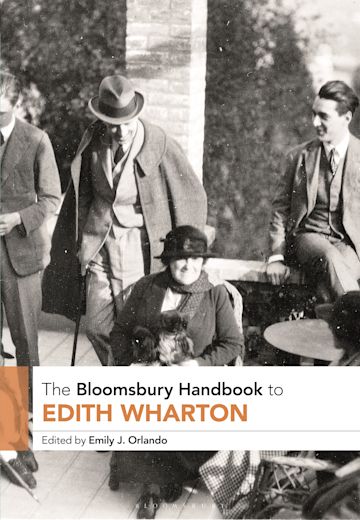The Bloomsbury Handbook to Edith Wharton
Chapter: Seeking a Home for the Wretched Exotics: Edith Wharton’s Heterotopic Views of Greece
- Contributor
- Editor
- Publisher
- Year
- ISBN
- Language
- Myrto Drizou
- Emily J. Orlando
- Bloomsbury Academic
- 2022
- 9781350182943
- English
Book Description
Bringing together leading voices from across the globe, The Bloomsbury Handbook to Edith Wharton represents state-of-the-art scholarship on the American writer Edith Wharton, once primarily known as a New York novelist.
Focusing on Wharton’s extensive body of work and renaissance across 21st-century popular culture, chapters consider:
- Wharton in the context of queer studies, race studies, whiteness studies, age studies, disability studies, anthropological studies, and economics;
- Wharton’s achievements in genres for which she deserves to be better known: poetry, drama, the short story, and non-fiction prose;
- Comparative studies with Christina Rossetti, Henry James, and Willa Cather;
- The places and cultures Wharton documented in her writing, including France, Greece, Italy, and Morocco;
- Wharton’s work as a reader and writer and her intersections with film and the digital humanities.
Book-ended by Dale Bauer and Elaine Showalter, and with a foreword by the Director and senior staff at The Mount, Wharton’s historic Massachusetts home, the Handbook underscores Wharton’s lasting impact for our new Gilded Age. It is an indispensable resource for readers interested in Wharton and 19th- and 20th-century literature and culture.
Chapter Description
Seeking a Home for the Wretched Exotics: Edith Wharton’s Heterotopic Views of Greece by Myrto Drizou
This essay explores Wharton’s encounter with Greece as a dynamic inquiry in the construction (and destabilization) of modern cultural identities. It argues that Wharton’s views of Greece question the binary of cultural rootedness (best represented by French historical continuity) on one hand, and displacement (mostly associated with American modernity) on the other. Irreducible to either paradigm, Wharton’s perspective of Greece is attuned to the cultural, ethnic, religious, and geopolitical heterogeneity of the Greek topos in ways that anticipate the Foucauldian concept of heterotopia. Looking at Wharton’s diaries of the 1888 Vanadis cruise and the 1926 Osprey cruise, this essay examines various heterotopic sites—from ancient quarries that served as prison camps to monastic communities, palimpsestic churches, and famous ruins—to show how they invert and neutralize discourses, such as Orientalism and Western exceptionalism, making a lasting mark on Wharton’s poetry and fiction.

